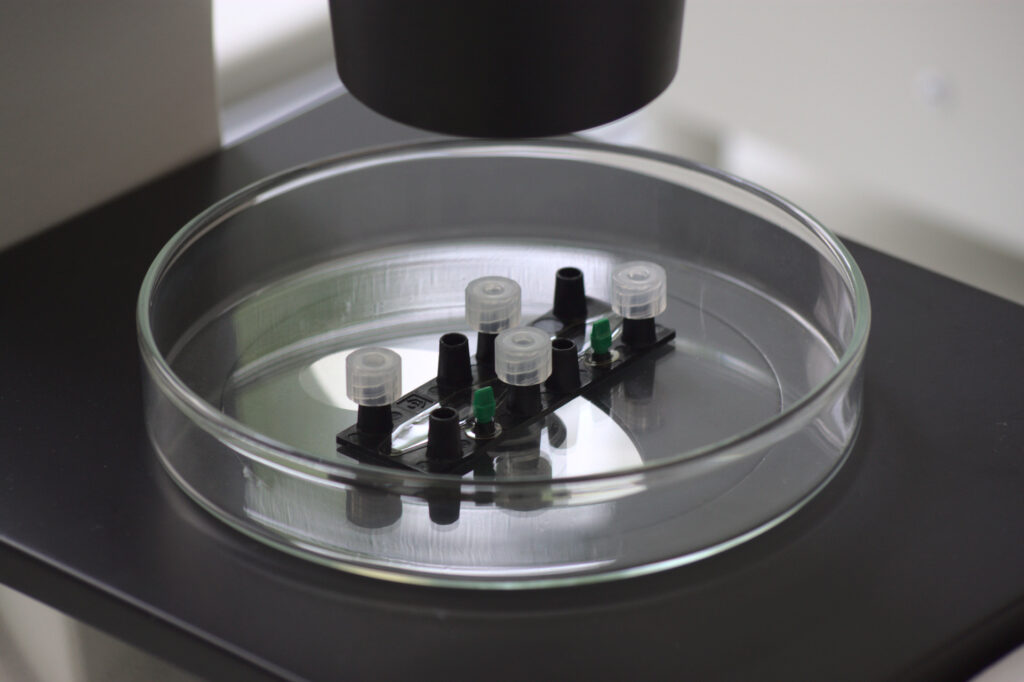Future technology Organ-on-Chip
Dynamic42 develops and individualizes novel microphysiological 3D in vitro test systems, so-called “Organ-on-Chip” (OoC). These are microfluidic systems on biotech chips that replicate human tissue units and their key functions. Our human in vitro model systems can be used in a variety of ways. With this technology, we cover potential applications in clinical research and development as well as in pharmaceutical and basic research.
Small chips – big potential
With the help of organ models, we are already increasing drug safety and advancing approaches for individualized medicine. In the future, the “mini-organ models” will also offer a safe alternative to animal testing, facilitating pharmacological and clinical studies and enabling major time and monetary savings in drug development.
Drug safety through drug testing on human tissue material
Before drugs are tested in clinical trials, they usually have to be tested in animal studies. The limitations of these tests are, on the one hand, ethical and legal issues and, on the other hand, the clear differences between animal and human tissue. The testing of active ingredients or chemical substances in animal experiments is not sufficiently informative for the reaction in humans. This often leads to drug failure or undesirable side effects. Whether a compound will be tolerated is of high economic and ethical interest. Therefore, there is an urgent need for reliable in vitro alternatives that mimic human organs as closely as possible.
Our human in vitro model systems contribute to safer testing of drugs and active ingredients in the context of consumer health. The technology simulates cellular structure and proper blood flow in interaction with the immune system in the human organ. By replicating functional properties of organs, it enables testing and evaluation of drug toxicity and tissue penetration. In addition, the flexible chip design can be adapted to organ biology, producing robust results in the early stages of drug testing. This increases drug safety and shortens development times.
Research into infectious diseases
The biotech chips are not only the basis for replicating human organs and testing active substances on them, but also enable further components to be added for research into infectious diseases. The established organ models are exposed to pathogens such as fungi. This results in so-called infection models that simulate disease development. On the one hand, this provides new insights into the course and spread of pathogens, and on the other hand, the interaction of these with the human immune system can be observed. This has the potential to map disease models as realistically as possible to the human response, to evaluate active substances even before the clinical phase, and to test already approved drugs for their effectiveness against infection.
Organ-on-chip as an innovation driver for individualized medicine
Organ-on-chip continues to be an appropriate technology for developing personalized advanced medicines in medical research. The novel biotech chips can help provide clues about how a particular patient will respond to a therapy, for example.
Tissue samples from patients are cultured in the organ models and analyzed for their particular medical interest. For example, this supports the observation of the development of tumor cells. The interest in this case is to test the positive and negative effects of various cancer drugs. The use of organ-on-chip ensures maximum scientific accuracy of testing and enables the transfer of findings to individual treatment methods.
If you would like to learn more about our biotech chips and organ and infection models, or have specific requirements in use for your research, please do not hesitate to contact us. Our experienced scientists will inform and consult you for your project!
More interesting articles:
Blog
Organ-on-chip applications by organ type – what has been done?
This blog lists examples of organ-on-chip models by organ type that have been used in the past, providing the respective literature for your reference.
Read MoreBlog
Exploring infectious disease dynamics through organ-on-chip technology
This blog explores established infection models using our organ-on-chip technology and their implications for scientific research.
Read MoreBlog
Immunocompetent Organ Models – the Future of Biomedical Research
One crucial factor that plays a pivotal role in the success of organ-on-cip models is immunocompetence. In this blog post, we delve into the significance of immunocompetence in organ-on-chip models and how it opens new avenues for advancing medical research.
Read More

